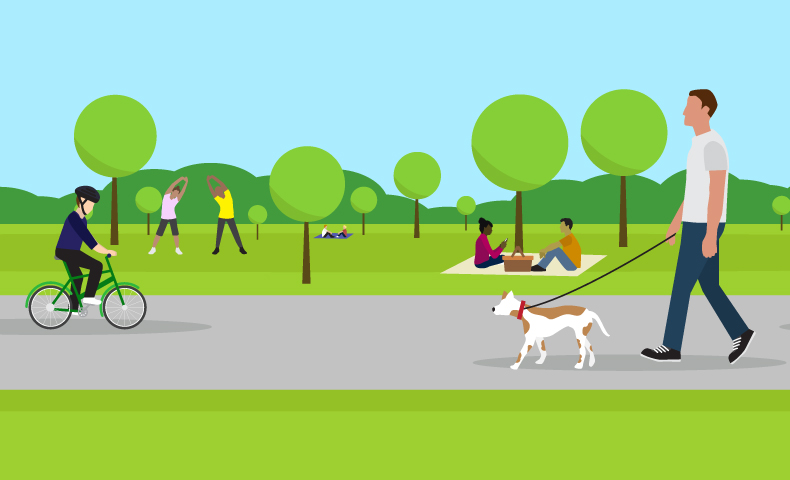
[Image description: A illustrated image shows people enjoying activities outside. A man is walking a dog, a person is biking, a couple of people are stretching.]
That old saying “You can’t outrun your troubles” may be true, but if you’re literally out for a jog, there’s evidence it can improve your mental state. Physical activity isn’t just good for your body; it also has benefits for your brain and your mental health.
How physical activity helps
Researchers have found that exercise:
- Prompts your body to release chemicals that boost your mood and help you feel relaxed
- Increases blood flow to your brain and supports the growth and maintenance of neurons, a type of cell that’s key to sending signals in your brain and nervous system
- Lowers your body’s levels of the stress hormones cortisol and epinephrine
That’s some of what biological science has found. In terms of real, day-to-day impact, physical activity has been shown to:
- Improve sleep, which is important to mental and emotional health (it’s been linked to depression, anxiety, bipolar disorder, and other mental health conditions)
- Maintain mental function as you age, including thinking, learning and judgment skills
- Enhance memory and mental performance
- Help you deal with stress
- Lower your risk of depression
- Boost your self-image
Exercise has also been recognized as a way to help treat and manage many mental health conditions, including addictions, anxiety, bipolar disorder, depression, eating disorders, grief and schizophrenia.
Tips for getting – and staying – physically active
Despite all these potential benefits, it can be difficult to get started or keep moving — especially if you’re depressed, stressed, or sleeping poorly. Here are some ways to get started and stay motivated:
- Start slow. If you haven’t been physically active in a while, try 10-minute bursts of activity. They can be beneficial, and they add up. (It’s also a good idea to check with your doctor if you’re starting or restarting an exercise program.)
- Set goals. Write down what you plan to accomplish – and your reasons why. Then track your progress; it will help keep you motivated. So will little rewards when you achieve your goals, so make those part of the plan.
- Make it fun. Turn on your favorite playlist and dance for 10 minutes. Toss a ball or play tag with your kids. Find an activity you enjoy that keeps you moving.
- Make it social. Enlist a buddy or bring the family. It can add to the fun – plus, social activity has its own mental health benefits.
- Make it fit. Find ways to work physical activity into already scheduled tasks: Take a walk-and-talk meeting or conference call around the parking lot. Cycle to appointments or the post office. And don’t forget that jobs like mowing the lawn, raking leaves and vacuuming all count as physical activity.
- Do it outdoors. Spending time in nature has also been shown to benefit mental health; it can reduce stress and help you feel calmer.
- Give yourself a break. If you miss a day or don’t reach your goal, focus instead on giving yourself credit for what you were able to do. And don’t let it stop you from trying again.
While staying physically active can help improve your well-being, you may also want to consult with a mental health professional who can help you identify your concerns, set goals and learn skills for coping. If you need support, therapists on LiveHealth Online are here to help.
Recommended Posts


